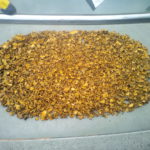
Oral submucous fibrosis (OSF) is a chronic disease of the oral mucosa recognised as an oral potential malignant disorder. It is significantly associated with areca nut chewing affecting mainly young males in their 20s to 40s and while mainly seen in South and East Asian countries immigration means it is distributed more widely.
Curcumin is a yellow substance derived from turmeric (curcuma longa) a member of the ginger family. Curcumin has been used to manage medical conditions, such as inflammatory bowel syndrome, rheumatoid arthritis, and pancreatitis with its benefits being attributed to its anti-inflammatory, antioxidant, antifibrinolytic, and anticancer properties. A number of trials have suggested that curcumin is effective in managing OSF but results of studies have been conflicting.
The aim of this review was to evaluate the available evidence on the effectiveness of curcumin in the management of OSF.
Methods
Searches were conducted in the Medline/PubMed, Scopus and ISI web of Knowledge databases.
Randomised control trials (RCTs) and uncontrolled clinical trials comparing curcumin against any medical intervention and or placebo for the management of patients with oral submucous fibrosis (OSF) were considered
Two reviewers independently screened the studies, abstracted data and assessed study quality against the CONSORT (Consolidated Standards of Reporting Trials) statement. Meta-analysis was planned by not conducted due to marked heterogeneity in the included studies.
Results
- 6 RCTs involving 298 patients (142 in curcumin groups and 156 in control groups) were included.
- All 6 studies were conducted in India.
- 3 RCTs used clinical and histopathologic diagnosis the other 3 used clinical features only.
- Only 1 study provided information on staging
- 5 studies used systemic curcumin, 1 topical.
- 3 studies found significantly higher improvement in burning sensation in the curcumin group compared with controls, whereas 3 other studies found comparable results.
- 2 studies showed better improvement in mouth opening in the curcumin group;
- 3 studies reported no differences in effectiveness;
- 1 study found curcumin to be inferior to conventional therapy.
Conclusions
The authors concluded: –
The available evidence remains inconclusive but suggests that curcumin is a promising effective treatment option for the management of patients with OSF. Further well-designed clinical trials with large sample sizes and adequate follow-up periods are warranted.
Comments
There have been a couple of reviews of treatments for oral submucous fibrosis since the 2008 Cochrane review by Fedorowicz et al. The number of available trials for each of the reviews is small and the quality of the available studies is also low so identifying effective treatments for this disease which is associated with significant morbidity remains a challenge. This current review has undertaken a good search strategy and while an assessment of study quality has been conducted using the Cochrane Collaboration risk of bias assessment tool would have been a better approach that the use if the CONSORT statement. As the review authors highlight the quality of the available studies for curcumin as a treatment is limited with poor reporting of clinical staging of OSF and adverse events. The is also marked variation in the dosage and frequency of use and follow up of the studies. The need for well conducted and reported trials of appropriate size to properly assess the effectiveness of some of the treatments that have demonstrated some benefits for OSF is clear.
Links
Primary Paper
Al-Maweri SA. Efficacy of curcumin for management of oral submucous fibrosis: a systematic review of randomized clinical trials. Oral Surg Oral Med Oral Pathol Oral Radiol. 2019 Jan 16. pii: S2212-4403(19)30015-X. doi: 10.1016/j.oooo.2019.01.010. [Epub ahead of print] Review. PubMed PMID: 30745280.
Other references
Dental Elf – 5th Dec 2019
Fedorowicz Z, Chan Shih‐Yen E, Dorri M, Nasser M, Newton T, Shi L. Interventions for the management of oral submucous fibrosis. Cochrane Database of Systematic Reviews 2008, Issue 4. Art. No.: CD007156. DOI: 10.1002/14651858.CD007156.pub2.
Picture Credits
